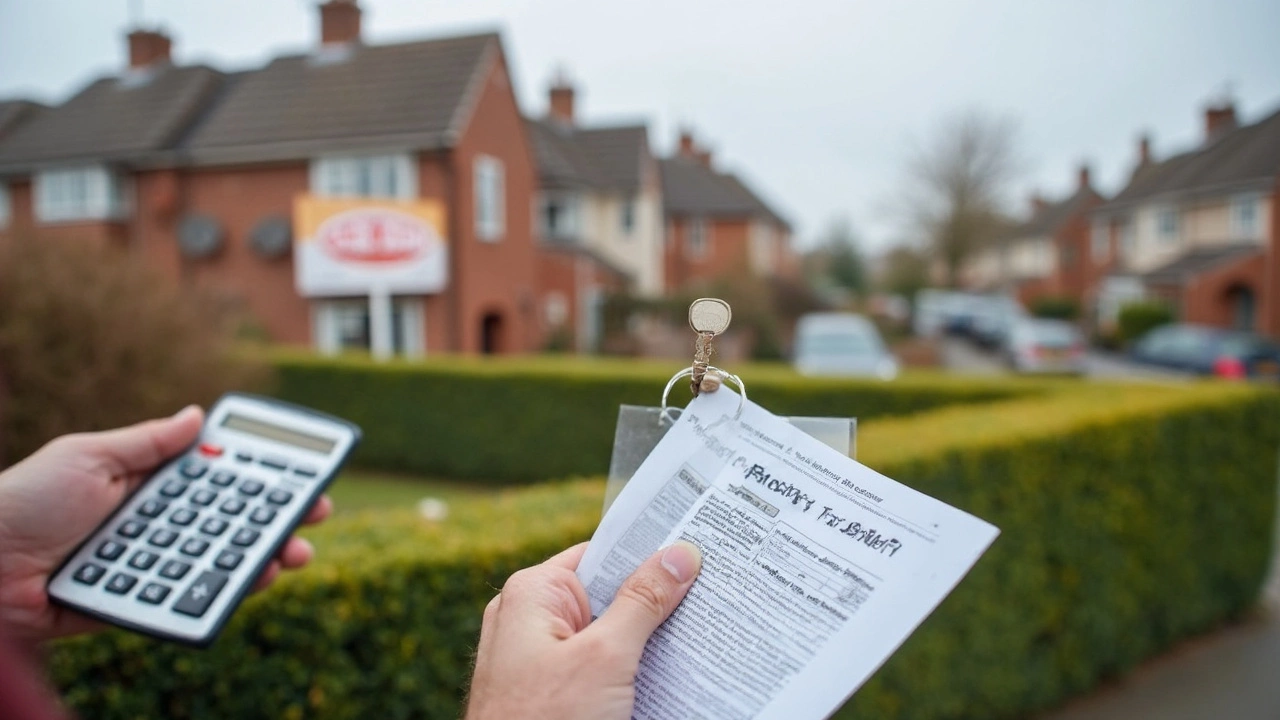Trying to borrow 100k from a bank for your first home? It sounds like a huge number, but it’s actually pretty doable if you know what banks are looking for. They’re not just tossing out money to anyone who asks—they want proof you can handle the loan and pay it back on time. That means your credit score, income, and debts are under the microscope.
Banks are super picky about your credit score. For a $100k mortgage, most lenders want to see at least 620, but better rates kick in at 700+. If your score is lower, getting approved gets trickier—and you might end up paying more interest. Lenders also check your income and job status. If you’re just starting out or switching jobs, expect them to ask for pay stubs, tax returns, and maybe even a letter from your boss.
Don’t forget about the down payment. Even with first-time buyer perks, most banks want to see at least 3% down, and some need even more. Got some money stashed away? Good—it proves you’re serious. They’ll also want your debt-to-income ratio in good shape. If you’re juggling a bunch of credit card bills or student loans, it might be time to trim those down before applying.
- Figuring Out If You Can Get Approved
- What Banks Really Want From You
- Smart Ways to Boost Your Chances
- Common Pitfalls and How to Dodge Them
Figuring Out If You Can Get Approved
Banks aren’t tossing out $100k to anyone—especially if you’re a first time buyer. Your odds of getting a home loan depend on a few main things: credit score, income, job stability, and how much you already owe.
Let’s break it down. Most banks want to see your credit score at least at 620 for a basic bank mortgage. But here’s the kicker: once you hit a score of 740 or higher, you can score much better interest rates, which can save you thousands. If your number’s low, it’s worth taking a few months to pay down some debts or clean up your credit report.
- Income: Lenders require proof you actually make enough to pay the money back. This usually means showing your last two pay stubs and maybe the last two years of tax returns.
- Job Stability: Got a new job or freelance gig? Banks will ask lots of questions. If you just started work, some banks make you wait six months to a year before applying for a home loan.
- Debt-to-Income Ratio (DTI): Here’s a fancy term for a simple idea—how much of your paycheck goes toward debt payments. Most banks get nervous if your DTI is over 43%. The lower, the better.
- Down Payment: Putting down 3%-$5% makes you look good to lenders. For a $100k home, that’s $3,000-$5,000 minimum, not counting closing costs.
Here’s what banks typically look for when you want to borrow 100k:
| Requirement | Minimum Standard |
|---|---|
| Credit Score | 620 (740+ for best rates) |
| Down Payment | 3%-5% |
| Debt-to-Income Ratio | Below 43% |
Don’t forget about extra proof—banks may want bank statements, proof of any other assets, and even letters explaining weird stuff in your financial history. If your paperwork is messy or you don’t know your own numbers, you could get slowed down or even denied.
If you’re still not sure whether you qualify, most lenders offer free prequalification tools online. This quick check doesn’t affect your credit and gives you a reality check on whether you’re ready to apply for a home loan or if you need a little more prep work first.
What Banks Really Want From You
Banks have a checklist when you ask to borrow 100k for a home. It’s not a mystery, but you need to get everything right. The big three things they care about? Your credit score, your income, and your debt. If you’re missing one, your odds take a hit.
Credit score is the first thing lenders pull up. For a first time buyer, a score of 620 is usually the absolute minimum. If you’re above 700, you’re golden. That’s when banks start giving better interest rates and more flexible loan terms. If your score is shaky, consider paying down some debt or fixing any mistakes on your credit report before you apply.
Next up is income. Lenders want to see steady paychecks. They’ll check your W-2s or 1099s, look at bank statements, and may even call your employer. Most banks like to see at least two years in the same field. If you’re self-employed, they’ll definitely want a couple years’ tax returns and a solid paper trail proving your income isn’t a fluke.
Banks also care about your debt-to-income ratio (DTI). Here’s where it gets real: most lenders don’t want your DTI to go over 43%. That means when you add up your monthly debts (credit cards, car loans, student loans, and your new mortgage payment), it shouldn’t eat more than 43% of what you bring home each month.
| Requirement | Minimum Standard |
|---|---|
| Credit Score | 620 (700+ for best rates) |
| Down Payment | 3% - 20% of purchase price |
| Debt-to-Income Ratio | <= 43% |
| Employment History | 2 years (preferably steady) |
And don’t forget about the down payment. A bigger down payment, like 20%, makes banks extra happy—you might even avoid mortgage insurance. But lots of first time buyer programs let you go as low as 3%. Just know, the higher your down payment, the less you’ll owe (and pay in interest).
Final thing: paperwork. Banks will want everything in writing—pay stubs, tax returns, bank statements, even proof of any gifts used for your down payment. Missing paperwork can totally stall your home loan application, so keep everything handy and organized.

Smart Ways to Boost Your Chances
If you want to boost your odds of getting approved to borrow 100k for your first home, you’ve got options. It’s not only about showing you have a steady job. You have to put yourself in the best light for the bank’s checklist.
- Bump up your credit score: Check it for free with tools like Credit Karma. Pay down your credit cards so your balance is under 30% of your limit. If there are late payments or mistakes in your report, dispute them—fixing a single error can shoot up your score by 20 points.
- Save for a bigger down payment: Tossing a bigger chunk of your own savings at the house shows banks you’re serious. When you borrow 100k, a down payment of 5% gets you cheaper rates than just scraping by with 3%. Try using direct deposit to put a slice of every paycheck right into your home fund.
- Lower your debt-to-income ratio: If your credit cards, car, or student loans are eating up too much of your monthly paycheck, pay down what you can before applying. Banks often say 43% (all your debts compared to your income) is the magic number, but lower is better.
- Get pre-approved first: This doesn’t just help you see how much you actually can borrow—it makes your offer stronger when you find a house you want. Sellers and agents take you more seriously, and you can lock in current interest rates for up to 90 days.
- Check out first-time buyer programs: FHA loans let you get away with lower down payments, and state-run programs might even give you free money for closing costs. It’s worth a look in your area.
Banks want to see consistency in your income. If you switched jobs lately, wait until you’ve got at least two paychecks from the new company before you apply. And don’t go opening new credit cards or making big purchases while you’re waiting to hear back. Even buying a new couch on credit can swing your debt-to-income ratio the wrong way.
| Boosting Your Chances at a Glance | Why It Matters |
|---|---|
| Credit Score 700+ | Qualifies you for better rates |
| Down Payment 5% or more | Lower monthly payments |
| Debt-to-Income Ratio below 36% | Shows you can handle the home loan |
| Pre-approval Letter | Makes your offer stronger |
Common Pitfalls and How to Dodge Them
Lots of folks trip up when trying to borrow 100k for their first home. You don't want to waste time—or money—making basic mistakes. Here are the big ones to watch out for, and some easy ways to dodge them.
- Ignoring your credit report. Banks will comb through your score, so check it yourself first. If something’s wrong, fix it before applying. A study in 2023 found about 1 in 5 credit reports had errors that could tank your chances or bump up your interest rate.
- Relying on the bank’s word alone. Sometimes you get told you’re “pre-approved,” but that’s not a guaranteed “yes.” Don’t start making offers on houses based on a pre-approval letter—always double check, because banks pull your credit again right before closing.
- Skipping the real math on payments. It’s easy to focus on the loan amount and forget about random extra costs—like insurance, taxes, and closing fees. These can add hundreds to your monthly payment. Always ask your lender for a full breakdown, so there are no ugly surprises.
- Not shopping around. First-timers often trust the first bank they talk to. But rates and fees can vary a lot—sometimes over 1% between lenders, which can cost you thousands in the long run. Compare at least three offers side by side.
- Empty bank account after down payment. Lenders actually like to see that you have some "backup" money left after your down payment and closing costs. Don’t wipe out your savings—set aside at least a few months of expenses if you can.
Here’s a quick look at how extra costs can hit your payments when you borrow 100k for a home:
| Expense | Monthly Estimate |
|---|---|
| Mortgage | $700 - $850 |
| Home Insurance | $60 - $120 |
| Property Taxes | $100 - $250 |
| PMI (if under 20% down) | $50 - $150 |
So if the bank offers you a low payment, double-check what’s actually included. Surprises mess up budgets, and even a few hundred bucks extra can wreck your monthly plans. Use this info to stay on top of all your costs before you sign anything.


Corbin Fairweather
I am an expert in real estate focusing on property sales and rentals. I enjoy writing about the latest trends in the real estate market and sharing insights on how to make successful property investments. My passion lies in helping clients find their dream homes and navigating the complexities of real estate transactions. In my free time, I enjoy hiking and capturing the beauty of landscapes through photography.
view all postsWrite a comment